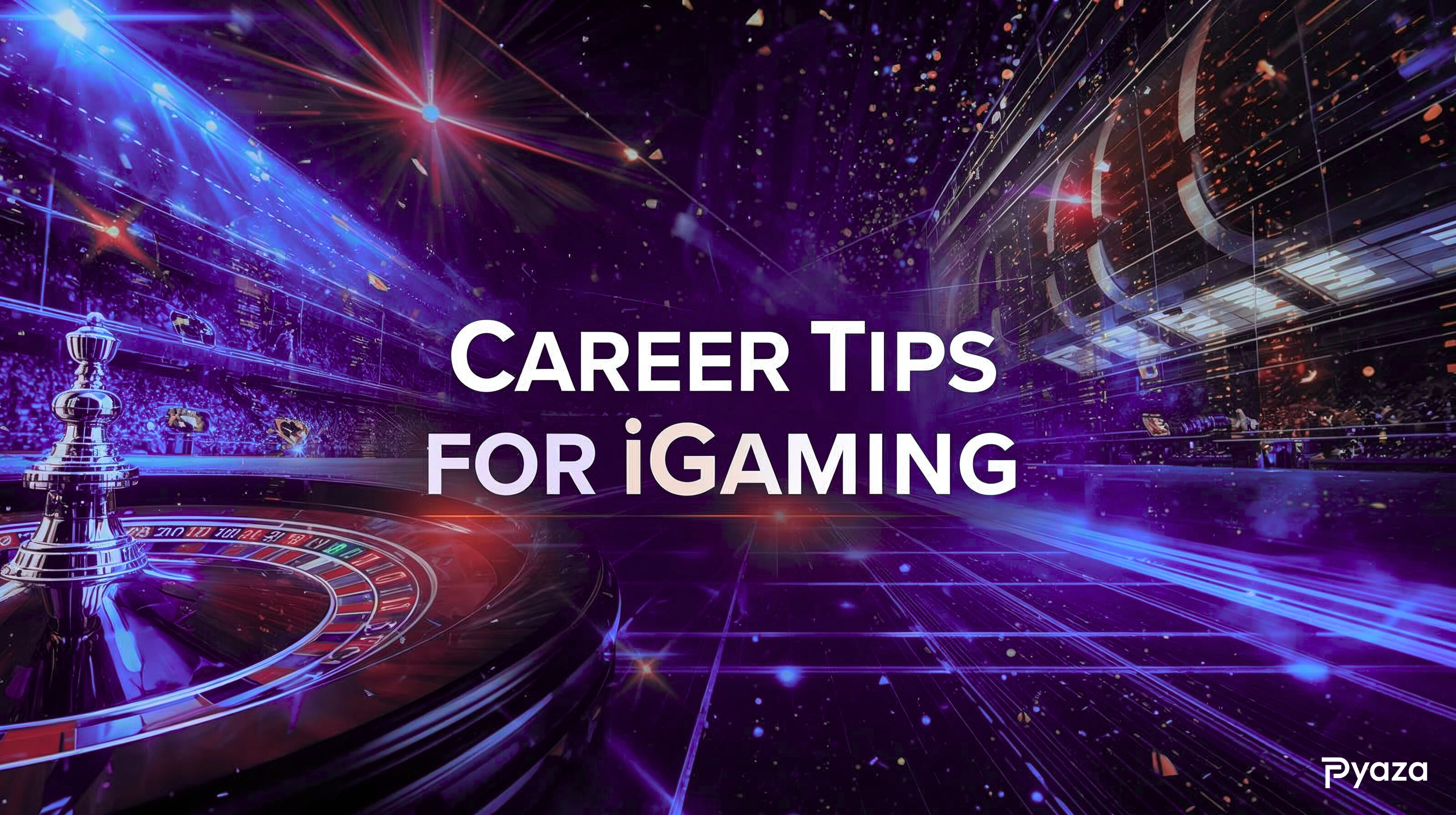The Future of iGaming
Technology, Jobs and What Comes Next
)
Miguel Spiteri
Marketing Manager - Pyaza
Introduction
From Betting Shops to AI
It started with shady backroom betting shops and unregulated slips passed under the counter. From there it moved into legalized retail sportsbooks, then onto the internet, and today it thrives on mobile apps, social media, and AI-powered platforms.
The iGaming world has come a long way. Not too long ago, sports betting meant walking into a retail sportsbook, waiting in line, and handing over cash at the counter. Affiliates used to hand out flyers at colleges or outside stadiums, convincing people to try a casino or betting service. Then the internet arrived and everything changed. Players could log on from their homes, browse odds, and place bets without ever stepping foot in a shop. Online casinos brought the same thrill of the tables to a laptop screen or tablets, opening the doors to a global audience.
Fast forward to 2025 and the experience has shifted again. Social media has become one of the strongest drivers of awareness, mobile apps put sportsbooks in everyone’s pocket, and AI powers everything from live odds to personalized gaming recommendations. What started as a simple in-person exchange has grown into a fully digital, always-on ecosystem.

How Technology Changed Awareness and Growth
Technology has not only made iGaming more convenient, it has made it mainstream. Online gambling is no longer something tucked away in a betting shop. Influencers talk about odds, TikTok creators review slot games, and streaming platforms are filled with winning bet slips, live reactions, betting tips, and even people streaming themselves gambling on slots for audiences that number in the millions.
The market has exploded as a result. The global online gambling sector is valued at an estimated $100 billion in 2025 and is on track to almost double within the next few years. What was once seen as a niche hobby is now part of mainstream entertainment, powered by the internet, social media, and constant innovation.
Jobs in iGaming Today
Behind every bet slip and digital slot screen are thousands of people making sure everything runs smoothly. The iGaming world is powered by a diverse and growing workforce that covers operations, technology, creative work, retail, and live events.
Operations teams include customer support agents, fraud specialists, and compliance officers who keep platforms safe and trustworthy. On the technical side, developers, software engineers, payment specialists, and data scientists make sure the systems perform reliably.
Creative and marketing teams build the look and feel of the experience, from designers and content writers to affiliate managers and social media experts.
In markets where physical venues are still important, sportsbook clerks, casino staff, promoters, and event hosts bring the industry to life in person. Specialized roles are also growing, such as AI trainers, responsible gaming experts, and localization professionals who adapt platforms for different languages and regions.
Global employment in sports betting and casino, including online operators, affiliates, suppliers, and related roles, is estimated at around 2 million jobs when the full scope of online casino operations is included. In the United States alone, more than 700,000 people work directly in the gaming industry, while in smaller countries like Malta, iGaming supports around 10,000 jobs, equal to about 5-6% of the entire workforce. In Malta it also contributes roughly 13 percent of the national GDP, showing just how central it is to the local economy.
While Malta is one of the best-known hubs, it is far from the only one. Gibraltar has become home to several of the world’s largest betting brands, while the Isle of Man was one of the first jurisdictions to license online gambling back in 2001 and remains a trusted base for operators. The United Kingdom is still one of the most mature markets, with tens of thousands employed across betting, casinos, bingo, and lottery under the oversight of the UK Gambling Commission. Spain and Italy have expanded significantly, creating new jobs in marketing, operations, and technology, while Cyprus is rising as an emerging hub for companies looking for fresh talent. Eastern Europe has also stepped into the picture, with Romania and Bulgaria offering strong pools of skilled workers at competitive costs.
Outside Europe, the United States has seen rapid job growth since sports betting was legalized in 2018, particularly in New Jersey, Pennsylvania, and Nevada. Canada’s Ontario market has quickly become one of the most attractive hubs in North America, drawing in international operators and creating thousands of roles. Latin America is also expanding at a fast pace, with Brazil’s regulation in 2024 opening the door to major growth, while Mexico, Colombia, and Argentina continue to build thriving iGaming sectors. In Asia, the Philippines has long been a hub for international operators, and Macau, while famous for its physical casinos, is gradually adding online structures of its own.
Taken together, these hubs highlight how iGaming is now a truly global employer. From European regulators to American sports betting states and Asian tech hubs, the industry offers careers that stretch across borders and cultures. It is a workforce that continues to grow and adapt, reflecting how quickly the sector itself is changing.

The Next 5 Years: AI and New Tech
Artificial intelligence is already reshaping how the industry operates. KYC systems that once needed entire teams now verify players automatically. Algorithms update odds in real time without human traders. Chatbots can handle thousands of support queries in multiple languages at the same time.
Some jobs will be reduced, especially repetitive or transactional roles. Manual data entry, basic content creation, and simple odds updating are all being taken over by automation.
Payments are also evolving quickly. Traditional card transactions and e-wallets remain popular, but crypto and blockchain solutions are becoming easier to adopt. Faster withdrawals, cross-border payments, and lower fees make digital currencies attractive to both operators and players. Stablecoins in particular could bridge the gap between traditional finance and gaming, offering speed and transparency while keeping volatility low.
At the same time, new opportunities are opening up. Companies need AI trainers, prompters, data analysts, user experience specialists, compliance experts, and marketing professionals who know how to build trust with players. Human creativity, judgement, and the ability to connect with customers cannot be replaced by machines. Yet.
But what happens if we reach artificial general intelligence, where machines can think and act with the same flexibility as people?
The gambling world would look very different. Imagine online casinos run by AGI systems that design games in real time, adapt odds based on millions of live data points, and predict player behavior with near-perfect accuracy. If AGI becomes reality, it could generate new slot titles and table games every minute; dynamically tailored to each player’s style and past behavior, turning the industry into a nonstop stream of personalized content.
Entire platforms could be operated with minimal human involvement, raising tough questions about fairness, transparency, and the future of work in the sector. Would regulators be able to keep up with machines that learn faster than people can legislate? And would human players trust an AI dealer that knows more about their habits than they do themselves?

Career Tips for Young People Entering iGaming 2025
If you are just starting to think about your career, the iGaming sector is still full of opportunity, but the skills that matter are changing fast. With AI already automating large parts of development, design, and even customer support, the best way to prepare is to focus on areas where humans remain essential.
The first step is obvious: be fully in the world of the internet, socials, and virtual spaces. iGaming lives online, and the best way to learn is to immerse yourself in the content. Watch videos about iGaming on TikTok, YouTube, and Twitch, and see how creators build communities around slots, betting tips, and live reactions. Join casino or sports betting forums and follow discussion threads to understand how players think. Scroll through X to check trending topics and debates in real time, and keep an eye on dedicated iGaming news sites to stay up to date with industry developments. The more you watch, listen, and participate, the more you’ll start to think like both a customer and an insider.
Learn the language of casinos, betting odds, and gameplay. Visit casino and sportsbook websites, create accounts, and place small bets to understand how the systems work. Explore the interfaces, test promotions, and get a feel for how players are guided through the experience. You need to be the customer before you can truly understand the customer, and that insight is essential if you want to build a career in this space.
Next, niche down. Specializing in a sport or two, or in a particular vertical like slots or live dealer games, makes you far more valuable than being a generalist. If you know football inside out, you can create sharper betting content than an AI. You have the human feel, the emotion and storytelling that a robot cannot replicate. Understanding the passion of a derby match, the heartbreak of a last-minute goal, or the excitement of a big underdog win gives your writing an authenticity that keeps players engaged in a way AI still struggles to match.
Human engagement still matters. Live events, poker tables, and in-person tournaments rely on human presence. A live dealer’s smile or a tournament host’s energy cannot be fully replicated by a machine, at least not in a way that feels authentic.
Finally, put artificial intelligence knowledge at the top of your list. Whether it is learning how AI powers odds calculation, fraud detection, or player personalization, being fluent in AI will set you apart. Pair that with an understanding of regulations and responsible gaming, and you will be building skills that go beyond what machines can replace.
Learn how to work with AI instead of against it. Prompting, refining, and guiding AI tools will be one of the most important skills in the next few years. Understanding how AI works, what it can and cannot do, and how to direct it toward safe and responsible outputs will be critical.
Start experimenting with tools like ChatGPT, Google Gemini, Canva AI, MidJourney, Claude, Perplexity AI, Runway, and Notion AI.
Each of these platforms is shaping how people create, design, and communicate online while also helping with everyday life. Chatbots like GPT or Gemini are already replacing the old habit of Googling everything. And let’s be honest, if Gen Z and Millennials do not catch up to Gen Alpha on this wave, they risk ending up like Gen X or worse the Boomers.
Get comfortable with them, not just as a user but as someone who knows how to push them to produce better results. The more fluent you are in working alongside AI, the more valuable you will be in an industry where automation is becoming the norm.
The iGaming world is moving quickly. If you can live inside its culture, specialize in something meaningful, and work alongside AI rather than being replaced by it, you will still have a strong career path ahead.

Final Thoughts
Technology has taken iGaming from hidden betting shops to global online platforms, and now AI is leading the next leap. The industry is faster, smarter, and more connected than ever before. But progress only matters if it empowers people as well as companies.
If automation strips away too many jobs, the same communities that fuel iGaming could lose their place in it. Balance is key: machines should enhance creativity, trust, and safety, not replace the human spark that makes gambling exciting in the first place.
Because in the end, technology can power the games, but people are the players. And without players, there is no iGaming.
Download the Pyaza APP to follow our coverage, connect with the team, and get involved in upcoming creator campaigns.